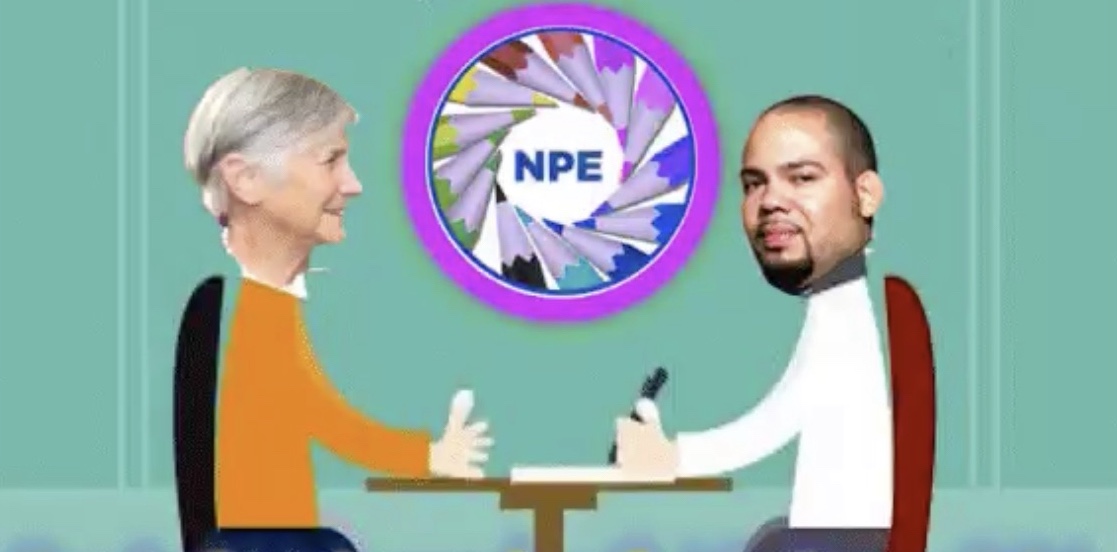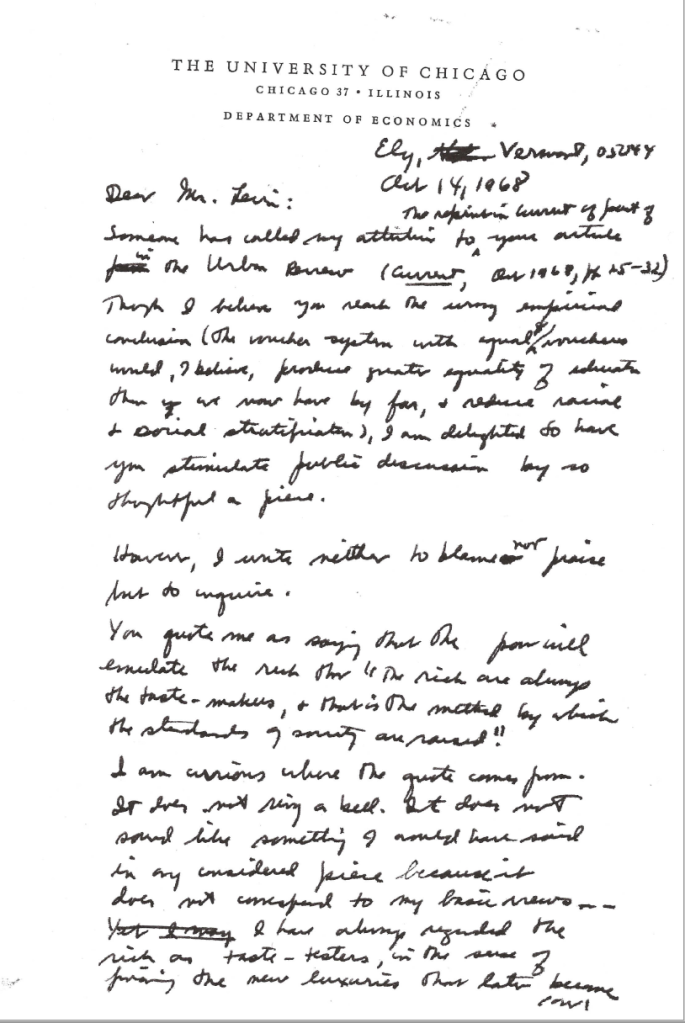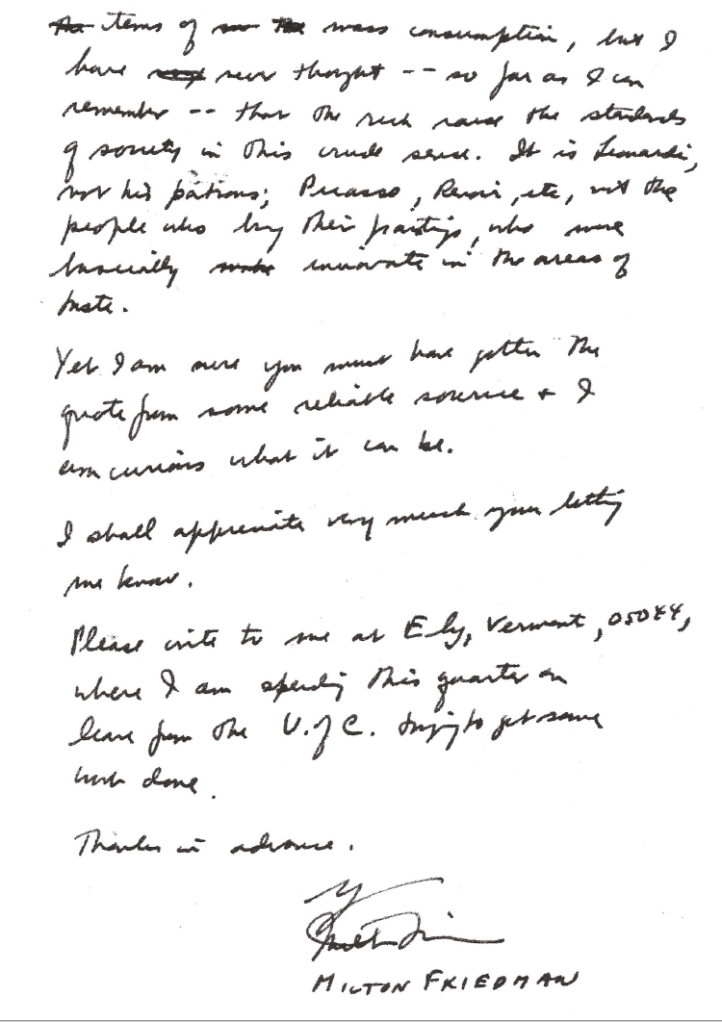I am working on a new chapter about school choice for an upcoming book by David Berliner. I have a primary source letter from Milton Friedman to Hank Levin. However, I can’t read Milton’s difficult handwriting. Is there a generous volunteer out there somewhere willing to help? If you could leave the translation in comments that would be wonderful!
Diane Ravitch in conversation with Julian Vasquez Heilig
Last night I had a chance to sit down with Diane Ravitch on Zoom and discuss what should be next for the US public education system.
Please Facebook Like, Tweet, etc below and/or reblog to share this discussion with others.
Check out and follow my YouTube channel here.
Twitter: @ProfessorJVH
Click here for Vitae.

Ideology at work: The politics of school choice research
Ever wonder why a lion’s share of positive (non-peer reviewed) findings about school choice come from certain places? We take on that question in our new piece published in the 2nd edition of the Handbook of Research on School Choice. To conceptualize the politics of research on school choice, it is important to discuss the politics of market-based approaches within the broader purview of public policy. Modern notions of “markets” and “choice” in schooling stem from the libertarian ideas Milton Friedman espoused in the 1950s. Considering the underlying politics of school choice, it is important to examine the ramifications of neoliberal and collective ideology on market-based school choice research. In this chapter we point out that much of the research suggesting positive findings is continually conducted and promoted by neoliberal ideologically-driven organizations. We begin with a synthesis of the pertinent literature on the conceptions and the funding of market-based school choice research to establish a background of understanding. Next we discuss the role of the production and politics of market-based school choice research for conceptualizing the current educational policy environment. In the third section, we delved into the politics of community use of market-based school choice research. We conclude by discussing the implications of how the comingling of ideology, methods and funding informs the public discourse about market-based schools choice and fit into the larger conversation about education reform.
Here are all of the contributors:
Please read our contribution to the handbook here.
Vasquez Heilig. J., Brewer, J. & Adamson, F. (2019). The politics of market-based school choice research: A comingling of ideology, methods and funding, In M. Berends, A. Primus and M. Springer (Eds.) Handbook of Research on School Choice, 2nd (pp. 335-350). New York, NY: Routledge.
Please Facebook Like, Tweet, etc below and/or reblog to share this discussion with others.
For all of Cloaking Inequity’s posts on charters click here.
Check out and follow my YouTube channel here.
Twitter: @ProfessorJVH
Click here for Vitae.
Betsy DeVos wants $5 billion, Should we Oblige?
Betsy DeVos just proposed a $5 billion school choice proposal, asking the Congress for a national tax credit scholarship program that would allow parents to send their children to a private K-12 school of their choice. What are the particulars? She does not use the word “voucher” (likely because voters keep turning back the approach), but instead uses “education savings accounts.” Essentially, the tax dollars are redirected into “scholarship” US News describes this launderific approach,
Individual donors would be able to contribute up to 10 percent of their adjusted gross income to a scholarship-granting organization approved by a state, and businesses would be able to contribute up to 5 percent of their net taxable income.
It’s already a switcheroo that is being used at the state level. The financial malfeasance associated with Arizona and Florida’s “education scholarship accounts” has been notorious. The Chattanoogan reports,
Fraud, accountability and transparency have been persistent negative problems associated with the implementation of ESA programs. As reported in the Arizona Republic, an October 2018 audit by the Arizona Attorney General found that more than $700,000 was misspent on any number unrelated items such as beauty supplies, sports apparel, computer technical needs, and unwarranted spending outside of the needs of students. Fraud has grown so rampant in Florida that for the last two years the Orlando Sentinel has run a series entitled, Schools Without Rules, where they have documented the effects of unlicensed and untrained educators, mismanagement of funds, failure to pay teachers and pecuniary expenses, and inadequate services provided to special needs students along with a wide assortment of unmet and unfulfilled assurances.
Furthermore, Michelman summarizes the lack of student success associated with vouchers and ESAs. While Oscar Jimenez-Castellanos, William J. Mathis, and Kevin G. Welner discuss the problematic legal implications.
To be frank, Betsy’s proposal is likely DOA in the US House and even perhaps the US Senate. US News posits,
…the proposal faces a steep uphill battle in Congress, where Democrats now control the House of Representatives and even the more moderate Republicans in the Senate, including Sen. Susan Collins of Maine and Sen. Lisa Murkowski of Alaska, have been wary of school choice policies that originate at the federal level.
I had the chance to talk with NPR’s Marketplace about the proposal for 20 minutes last week. Here is the 2-minute program where they probably used the least interesting 5 seconds of our conversation (just being honest).
DeVos is up to exactly what everyone said she would be up to, in fact, Trump promised $20 billion for school choice during his campaign.
Here’s a summary of my work on vouchers.
Peer-Reviewed articles
Portales, J., & Vasquez Heilig, J. (2015). Understanding universal vouchers and urban public schools in Santiago de Chile: Educational administrators’ responses to choice. Multidisciplinary Journal of Educational Research, 5(2), 194-237.*
Portales, J. & Vasquez-Heilig, J. (2014). Understanding how universal vouchers have impacted urban school districts’ enrollment in Chile. Education Policy Analysis Archives, 22(68). Retrieved from http://epaa.asu.edu/ojs/article/view/1427/1314*
Policy Briefs
Vasquez Heilig, J., LeClair, A.V., Lemke, M., & McMurrey, A. (2014). Remarkable or poppycock?: Lessons from school voucher research and data. Austin, TX: Texas Center for Education Policy, University of Texas at Austin.
Vasquez Heilig, J. & Portales. (2012). Are vouchers a panacea?: Data from international implementation. Austin, TX: The Institute for Urban Policy Research and Analysis, University of Texas at Austin.
Articles in The Progressive Magazine
What You Should Know about School Vouchers
Eight Questions Betsy DeVos Won’t Get Right about School Vouchers
Cloaking Inequity blog posts
https://cloakinginequity.com/category/vouchers/
Please Facebook Like, Tweet, etc below and/or reblog to share this discussion with others.
Check out and follow my YouTube channel here.
Twitter: @ProfessorJVH
Click here for Vitae.
From Portugal, with no Love from the Education Reformers
I recently had the opportunity to be the “skunk in the garden party” so to say at the 2019 International School Choice and Reform conference in Portugal.
https://www.instagram.com/p/BuCWQEQBtUf/?utm_source=ig_web_copy_link
I was invited by Steve Nelson, faculty member at the University of Memphis, to be the discussant for a panel entitled School Choice and Black Communities: Discussing Educational Equity and Educational Racism Beyond Test Scores. The researchers in the panel (go the the third photo in the instagram post above) discussed how market-based school choice has limited self-determination in the African American community. As you might expect there was quite a bit of pushback after the presentation from the audience that included leaders from EdChoice, Cato and other neoliberal supports of education privatization. In fact, the pushback basically came at us throughout the conference— during lunch, in the hallways etc. Pretty much the same experience that I had when I attended AEI education reform workgroups in past years (ask me about being in the room at AEI next time you see me and how I managed to get disinvited from their events— has something to do with Nazis, I am NOT lying).
Here are my remarks that I prepared, but not necessarily as delivered. I’ll follow the text with a YouTube video of the remarks.
The United States has not yet realized the 1954 mandate of Brown v. Board to address segregation and deep-seated education inequity across our nation.
Today, more than 60 years later, schools across the United States are still profoundly separate and unequal based on race and class.
As these papers demonstrate, our failure extends disparities across the spectrum of education including education law, performance, access to school boards, and how school discipline is administered.
It’s a national shame that the state-sanctioned sabotage of human potential is readily apparent in communities in Louisiana, Tennessee, Michigan and other states across the nation.
As these papers demonstrate, these issues are being amplified, in fact, made worse, by the school privatization and private-control movement, which #WeChoose community campaign has called the illusion of school choice
The NAACP and other community-based activists have called upon education reforms to refocus on inequality rather than privatization and private-control of education. They are seeking to move the discourse concretely from choice, to equity.
Jitu Brown, National Director, Journey for Justice Alliance, has talked about this problem in Chicago by asking the following questions:
- Why does one child have the opportunity to learn a world language and the other does not?
- Why does one school have debate teams, robotics clubs, social emotional support and the other does not?
He continues, unequal education is about access to resources and opportunity, not whether large numbers of schools are available. We must stand firm on the equity issue, critique structural and institutional racism, and advocate for the right for low income families to be treated with dignity and provided educational opportunity.
Organizing efforts to focus on community-based reform and equity instead of choice and privatization are growing.
The platform promoted by the NAACP, Movement for Black Lives and the #WeChoose coalition includes a moratorium on school privatization. Community advocates are also advocating for sustainable community schools, an end to zero tolerance policies; a national equity assessment of public education in the U.S.; to stop the attack on teachers of color; an end state takeovers, appointed school boards, and mayoral control; and finally, limit the continued over-reliance on standardized testing in public schools.
Community advocates are solution oriented as they are organizing to advance a progressive public education agenda in cities across the United States to inform and build momentum for a national consensus to end school privatization and support sustainable, community-based education reform as a remedy.
Both the NAACP and the Journey for Justice coalition have launched a series of critical conversation townhalls across the United States to listen to communities and understand their perspectives on the impact of Betsy DeVos on public education
The modern civil rights movement is also successfully engaging people power in social media and in person on the ground and undertaking critical conversations about privatization and private-control of public education.
Community stakeholders in cities across the United States have won sustainable community schools as an alternative to privatization, are seeking to stop school closings, are supporting progressive school board members, leading a revolt against standardized testing, and organizing boycotts to pressure policymakers to stop closing schools.
The NAACP and other community-based organizations continue to organize in cities across the United States to build the political will to advance a community-based education agenda focused on equity as an alternative to the privatization and private-control of public education. These organizations have laid bare that the United States is shortchanging communities of color and that the nation’s children deserve equal education opportunities offered by community-based education reform.
The trend towards private control of public schools and the failure of the approach has been made clear in Chicago, New Orleans, Detroit, Memphis, DC and many other cities
Indeed, while our schools have many successes, public education still needs improvement— especially to remedy the severe inequities.
Sixty years after Brown v. Board, education is still very separate and unequal. Despite decades of school choice policies and education privatization, wealthier students still have priority access to ideal educational environments.
Black and Brown communities are being denied those same opportunities and they are in many cities bear the onus of improving “failing” schools
But, there is hope for change. Hope remains in empowerment— in creating coalitions, in the ability to organize communities of educators and other public education stakeholders around the problem with school choice and our liberty to advocate for community-based education for students rather than private control.
As a heads up, tomorrow I will blog about “The Moral Disengagement of Education Reform” and cover an exciting new dissertation study!
Please Facebook Like, Tweet, etc below and/or reblog to share this discussion with others.
Check out and follow my YouTube channel here.
Twitter: @ProfessorJVH
Click here for Vitae.
Other good news:


You must be logged in to post a comment.